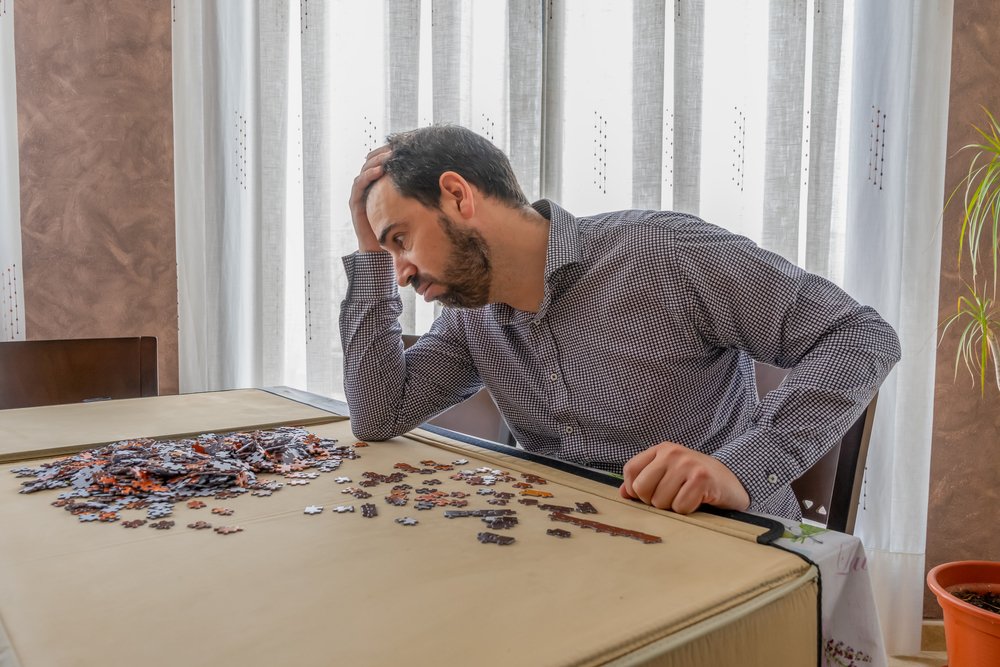Last Updated on January 25, 2024 by Gamesver Team and JC Franco

Jigsaw puzzles have been around for several centuries, and most people have played one at some point. Back in the day, when televisions, smartphones, and digital gadgets weren’t widely available, people used other forms of entertainment, including jigsaw puzzles. Then came the digital era, and people started to look for different ways to keep themselves occupied and entertained. And for some reason, jigsaw puzzles weren’t at the top of everyone’s entertainment list.
Generally, puzzles are the type of game that leaves people frustrated because some seem impossible to solve. Jigsaw puzzles may be rewarding for fans, but they may be too overwhelming and time-consuming for others. Even though jigsaw puzzles are famous, many people think they’re just pointless.
Solving jigsaw puzzles has many advantages but also some drawbacks. Here are some things to consider before you start a jigsaw puzzle.
These are 17 downsides and cons of jigsaw puzzles:
1. Jigsaw puzzles can take a long time to solve.
Many of the most challenging jigsaw puzzles have thousands of pieces. If you have more pieces in your set, it will be more complex and take longer to assemble and match them. Completing a puzzle can take hours, days, months, or even years, depending on your effort.
2. Some of them are hard.
If you enjoy playing jigsaw puzzles, you’re probably tired of simple ones. They no longer satisfy your need for problem-solving and entertainment. With that in mind, it’s important to mention that some of the puzzles out there are extremely hard to solve.
Among them is Micro Pure White Hell, a 1,000-piece puzzle with a white image and tiny pieces. Bgraamiens Puzzle also has a problematic 1,000-piece puzzle called The Line, which is a scribble of black lines on a white background. This one will be tricky to solve. Good luck!
3. It can trigger your frustration when you don’t find a matching piece.
Is there anything more frustrating than spending days and hours trying to solve a puzzle only to discover that you’re missing a few pieces? We’re going to leave it up to you to choose a word that describes your feelings when that happens.
4. If you lose or damage a piece, that’s game over.
Afterward, when your frustration and – probably – anger have subsided, you’ll have a clearer perception to search for the missing pieces. But they are nowhere to be found. You’ve looked under the table; you’ve looked inside the box. At this point, you probably destroyed the box just to see if it is hiding behind a flap. Your pieces are gone, and you can’t finish the puzzle.
5. There’s a website where you can order your missing pieces, but it’s expensive.
There’s hope if you missed your pieces. Jigsaw Doctor is a website that replaces damaged or missing parts of your jigsaw puzzles. All you have to do is send the pieces surrounding the broken or missing one. The only catch is that you will need to wait for 2 to 4 weeks after they receive your order before receiving your pieces back. In addition, it costs between $17 and $25 per piece plus shipping.
6. Not everyone is a fan of it, so you might end up playing alone.
Jigsaw puzzles don’t make sense to some people. They may think it’s boring or a waste of time. That means you might just end up playing by yourself, which may not always be a bad thing. However, if you would like to play this game with a group, make sure everyone is on board. Otherwise, you’d be better off not even suggesting it. Some people can’t bear to spend hours solving a puzzle.
7. You might need to take a break from it.
Large puzzles usually take a lot of time to complete, so take a break every now and then to eat or do something else, especially if you’re starting to feel anxious about not matching the pieces. Go for a walk, talk to someone, or do something else. Refresh your mind, then return to your puzzle.
8. They might get boring after a while.

If you are not patient enough to finish some puzzles, you may not even finish because you feel bored. It may be difficult for some people to find the right pieces, and they may think that their hard work isn’t worthwhile.
9. Some puzzles are too easy to solve.
Unless you’re a child, don’t play with children’s puzzles. It’s their lack of challenge that kills your vibe. If you choose puzzles that are boring to solve, then you won’t have a good time.
10. You need lots of room.
We already talked about 1,000-piece and 2,000-piece jigsaw puzzles, but you may not have realized that they require a flat surface. You need to do these high-piece puzzles in an area you don’t often use because they can take up a lot of space.
Your dining table is not the best place to do your puzzles, for example, because if you haven’t finished, where will you eat? Find an area on the floor or table where there won’t be much traffic.
11. You will get very angry if someone breaks it.
If someone accidentally breaks your puzzle after you’ve put so much time and effort into completing your puzzle, it will probably stir up a lot of anger inside you. Imagine the frustration you will endure after seeing your masterpiece scattered all over the floor.
12. There’s nothing you can do with it after you finish the puzzle.
Your puzzle took you hours to put together, but now what? What do you do with it? You could leave it out for a few days to show off what you’ve done, but unless you frame it, you will have to take it apart and store it. Indeed some may wonder what the purpose of all that work is if they can’t put it to good use.
13. You may feel like you need to frame all of the jigsaw puzzles you solved.
It seems like a waste of time if you don’t at least frame your puzzle so that it serves a purpose after all the hard work you’ve put into it. You may feel the need to frame it to give yourself peace of mind.
14. Putting away the puzzle can be annoying.
Once you’ve completed your puzzle, it’s time to put it away. You may find it exhausting and annoying to take the pieces apart. It’s another task that puzzles require of you.
15. The boxes take up space.
Despite their size, some puzzle boxes are larger than they should be. You’ve likely got more than one or two jigsaw puzzles in your collection if you like puzzles. If it becomes an addiction, you will buy many versions and end up with several boxes. Your home will have to make room for them.

16. You can become addicted to it.
The purpose of a jigsaw puzzle is to combine matching pieces to reveal an image. Although it sounds simple, it’s not always easy. It’s easy to get hooked on this challenge and find the mystery of where each piece goes incredibly engaging. Jigsaw puzzles also give you a sense of control since you are in charge of the outcome. Another reason why puzzles are famous is that they are rewarding and reduce stress.
17. Some jigsaw puzzles are unnecessarily pricey.
There are all kinds of jigsaw puzzles on the market. However, some of them are unnecessarily expensive. Some of them can sell for hundreds or thousands of dollars.
For instance, Stave Puzzles are known as “The Roll Royce of Wooden Jigsaw Puzzles”. This Vermont-based company sells hand-cut jigsaw puzzles made from five-ply, cherry-backed wood. If you want to check the prices, you can go to their website.
In closing
As with most puzzles, solving a jigsaw puzzle requires some strategic and logical thinking. If you enjoy mysteries and solving problems, then all of the drawbacks and disadvantages outlined here will not stop you from enjoying the game. In my opinion, there is nothing on this list that you can’t fix. You just need to find one puzzle that you like and believe is worth your time.

